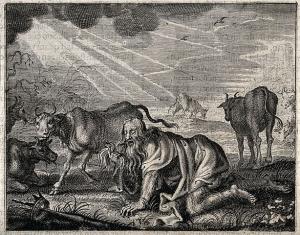In my book, The Word Set in Stone: How Archaeology, Science, and History Back Up the Bible (2023), in chapter 12, page 168, I have the following section:
King Nebuchadnezzar Eating Grass
Daniel 4:33 informs us that the Babylonian king, Nebuchadnezzar, “was driven from among men, and ate grass like an ox . . . and his nails were like birds’ claws.”
Prima facie, what Daniel describes in this section looks ridiculous, and we might perhaps be excused for thinking it is myth or legend. No doubt, this has not infrequently been used as fodder for cynical biblical skeptics, quick to mock the Bible as ahistorical (and Christians for believing that it does record actual history). In fact, however, what happened to this famous king is a documented medical and psychiatric condition.
The condition is called boanthropy. The website Online Psychology Degree Guide has an article that includes a section on this disorder.
Those who suffer from the very rare—but very scary—mental disorder boanthropy believe they are cows, often going as far as to behave as such. Sometimes those with boanthropy are even found in fields with cows, walking on all fours and chewing grass as if they were a true member of the herd. . . . Interestingly, it is believed that boanthropy is even referred to in the Bible, as King Nebuchadnezzar is described as being “driven from men and did eat grass as oxen.” (“15 Scariest Mental Disorders of All Time”)
A few days ago I got in the mood for joining an atheist discussion forum again. I’m weird that way. It’s always about 90% constant insults of Christians, Christianity, and the Bible, and 10% (if even that much) rational discussion, most of them only for brief “shining moments.” I posted this material and the response back from one person was that boanthropy is “associated with late stage syphilis, porphyria, schizophrenia . . .” and that it is a “grave and incurable disease” that one doesn’t “get better from . . . even with modern medicine.”
Okay; so she introduced a new and valid question: can someone recover from it, and lead a normal life again, as the Bible says Nebuchadnezzar did (Dan 4:34-37)? An article from a medical site that I found thinks it’s possible:
Psychologists prefer psychotherapy (talk therapy) and psycho-pharmacotherapy (antipsychotic drugs and anti-depressant drugs) to help an individual give up the bizarre state of delusion as soon as possible.
There are methods to manage the condition and help the affected individuals live to achieve relatively normal lives. Unfortunately, there is no cure for the disorder; thus, a treatment plan generally involves a combination of medication and therapy to help the individual control their delusions and hallucinations. In extreme or late cases, hospitalization is required. However, with a therapeutic approach to regain a normal life and maintain relationships, many people with boanthropy can lead fairly normal lives, and some can even work on the condition.
Obviously, they didn’t have the drugs back then; maybe they had some herbal treatments for mental disorders. But Nebuchadnezzar would have had to be helped to lead a normal life again primarily through counseling and therapy (whatever that meant in those days, but I’m sure they had some form of it). The above constitutes evidence contrary to the atheist’s claim, and it supports the biblical account of his recovering from it. It’s not a cure, but it is a return to relative normalcy. And that’s all we need to support the biblical account, so that one cannot dismiss it out of hand on this basis.
Another medical article reported on a Belgian woman who thought she was a chicken (a condition called zoanthropy). She got better, too:
Fortunately, this woman’s experience ended well. After about one year of disability, the patient was able to return to work progressively. Her mood remained stable and there were no more psychotic symptoms or any indication of epileptic episodes.
Even two cases already refutes a universal negative claim that no one gets better from these conditions, not “even with modern medicine”. I found another case of boanthropy where the person recovered, as noted in the European Psychiatry journal (Jan. 2018): “As he was accepting food, putting on weight, the delusion of being a cow faded away, and ultimately he made improvement.” “Three strikes and you’re out.” But wait! There’s more! An article in Unique Times also casually reports recovery:
Treatment Options
Treating Boanthropy requires a multidisciplinary approach involving psychiatrists, psychologists, and potentially neurologists. The main goal is to help patients regain their sense of self-identity and eliminate the delusions associated with their bovine identity. Therapeutic techniques may include:
-
Cognitive Behavioral Therapy (CBT): CBT helps patients challenge and reframe their irrational beliefs, focusing on grounding them in reality.
-
Medication: In some cases, antipsychotic medication might be prescribed to manage delusions and hallucinations.
-
Supportive Care: Patients benefit from a supportive and understanding environment to aid in their recovery and integration back into society.
So that’s four cases, found without too much effort. So far I haven’t found anything indicating that it’s “grave and incurable” and that “You don’t get better from these disease even with modern medicine.” Perhaps this atheist, having made the claim, can provide us with such a reputable source? When I’m challenged and someone questions my conclusions, I respond, and I do by seeking out and citing the requisite authorities.
***
It’s been an hour and thirty-five minutes as of this writing since I posted the above in the forum, and she still hasn’t offered a reply to my challenge. If she does, I will surely report it here. But she has a very difficult task: establishing her initial universal negative claim. All one has to do to refute that is offer one counter-example. I have provided four. If she shows one case where someone died or never resumed a normal life, that doesn’t prove that everyone dies or never recovers after they get this dreadful malady. So essentially, her task is impossible, which is, I suspect, why she hasn’t answered, and likely never will. She knows it’s impossible and that she has placed herself in a logical no-win situation.
*****
*
Practical Matters: Perhaps some of my 4,500+ free online articles (the most comprehensive “one-stop” Catholic apologetics site) or fifty-five books have helped you (by God’s grace) to decide to become Catholic or to return to the Church, or better understand some doctrines and why we believe them.
Or you may believe my work is worthy to support for the purpose of apologetics and evangelism in general. If so, please seriously consider a much-needed financial contribution. I’m always in need of more funds: especially monthly support. “The laborer is worthy of his wages” (1 Tim 5:18, NKJV). 1 December 2021 was my 20th anniversary as a full-time Catholic apologist, and February 2022 marked the 25th anniversary of my blog.
PayPal donations are the easiest: just send to my email address: [email protected]. Here’s also a second page to get to PayPal. You’ll see the term “Catholic Used Book Service”, which is my old side-business. To learn about the different methods of contributing (including Zelle), see my page: About Catholic Apologist Dave Armstrong / Donation Information. Thanks a million from the bottom of my heart!
*
***
Photo credit: Nebuchadnezzar, gone mad, grovels like a beast of the earth; he gropes for his crown. Dutch engraving, c. 17th century. (Wellcome blog post (archive). [Wikimedia Commons / Creative Commons Attribution 4.0 International license]
Summary: I reply to an atheist biblical skeptic regarding Daniel’s account of King Nebuchadnezzar thinking he was a cow (boanthropy). Is it curable? In fact, yes it is.














